*Note from A Chronic Voice: Erica shares some simple tips on how you can be a good friend to someone with chronic illness. It’s difficult to put yourself in their shoes, and I wouldn’t expect that of anyone. But showing some empathy is possible, and providing a listening ear is always appreciated. Most importantly of all, acknowledging that their pain is real can mean a lot to them. Check out Erica’s fantastic list of friendship tips here, which by the way, are also applicable to any other relationship!
Table of Contents
“We’re not meant to change anyone who isn’t willing or ready to change. What we can do is show up for them when they are ready to show up for themselves.” – Jennifer Williamson
One of the most painful aspects of my chronic illness has been dealing with loss and grief, especially in losing valued relationships with family and friends.
Battling a chronic illness is hard in so many ways. One of the hardest parts for me has been accepting support and letting those who care about me in. I’ve grown so accustomed to internalizing my emotions and processing new information on my own. Consequently, I end up isolating myself and turning anyone who tries to help away.
While I am at fault for many of my lost or faded friendships, there are so many things I wish I could have said that may have led to a different outcome in the relationships. I forget that sometimes my friends and family struggle just as much as I do in not knowing how to help and support me.
Here are 10 ways to be a better friend to someone with a chronic illness.
Seven Things You Can Do to Show Your Support:
1. Be Supportive When I Decide to Open up About My Illness
I constantly downplay my struggles because I don’t want to be that person who’s constantly complaining or being selfish. If I’m telling you about my pain, I’m deliberately choosing to be vulnerable with you because I want and need your support.
2. Listen Without Trying to Provide a Solution
Sometimes I’m just frustrated and complaining. I’m not looking for you to fix the problem – I just want someone to listen. I’ve more than likely tried or heard the suggestions or advice you have to offer. Listen with an open mind and really hear what I have to say.
3. Be Mindful That This Is My Own Chronic Illness Experience
While you might have a friend/aunt/co-worker who suffers from the same chronic illness, their experience is most likely completely different from mine. Each person experiences his or her disease and treatment in a unique way. While I know you may only be trying to help, try to refrain from drawing comparisons to others you know with similar conditions.
4. Take the First Step to Reach Out
I feel isolated all the time so when someone reaches out to me just to catch up, check in, or say hi, it can quite literally make my day. Text me, message me, Snapchat me, tag me – anything to remind me that you’re thinking of me and I’m not forgotten.
5. Be Mindful of the Types of Plans We Make
My energy levels are just not what they used to be. Keep in mind how draining things can be when making plans. Try to avoid loud restaurants, late nights or a lot of walking.
6. Find Ways to Help Me Stay Comfortable, When We’re Out Together
Often in large social settings, I get anxious and feel out of place – not everyone knows and understands my limitations. I struggle to verbalize how I truly feel because I get embarrassed. Help me find a place to sit and have a conversation one-on-one with me, or suggest we go to the bar to get a glass of water.
7. Accept Who I Am Today
Learn to embrace the new me. Don’t have high expectations or compare me to my old life – accept me for where I am right now, not where you want or need me to be.
Three Things You Should Never Do:
1. Don’t Just Assume – Ask Me
You know the saying, when you assume you make an ‘ass out of you and me’. Don’t assume I’m feeling fine because you think I look great. I know you’re trying to be nice, but it’s called an invisible illness for a reason. I hate having to explain why I may look fine but I’m not feeling any better. Instead, just ask me if I’m feeling better or if there’s anything else on your mind.
2. Don’t Take It Personally When I Have to Cancel Plans
Understand that I don’t cancel plans because I want to. It’s because I have to. I want to go but sometimes I just can’t and I already feel guilty about that.
3. Don’t Give Up on Me
One of my greatest fears is being a burden, so I isolate myself and push people away. When I stop hearing from you, it confirms my fears. Keep inviting me to hang out even if I often say no. One day I may say yes. I still want to feel included and be a part of a community.
How do your friends and family support you in your chronic illness journey?
*Note: This article is meant for educational purposes and is based on the author’s personal experiences. It is not to be substituted for medical advice. Please consult your own doctor before changing or adding new treatment protocols.
Read More: 4 Cool Truths My Partner Said (Unwittingly)
If you liked this article, sign up for our mailing list here so you don’t miss out on our latest posts! You will also receive an e-book full of uplifting messages, quotes and illustrations, as a token of appreciation!
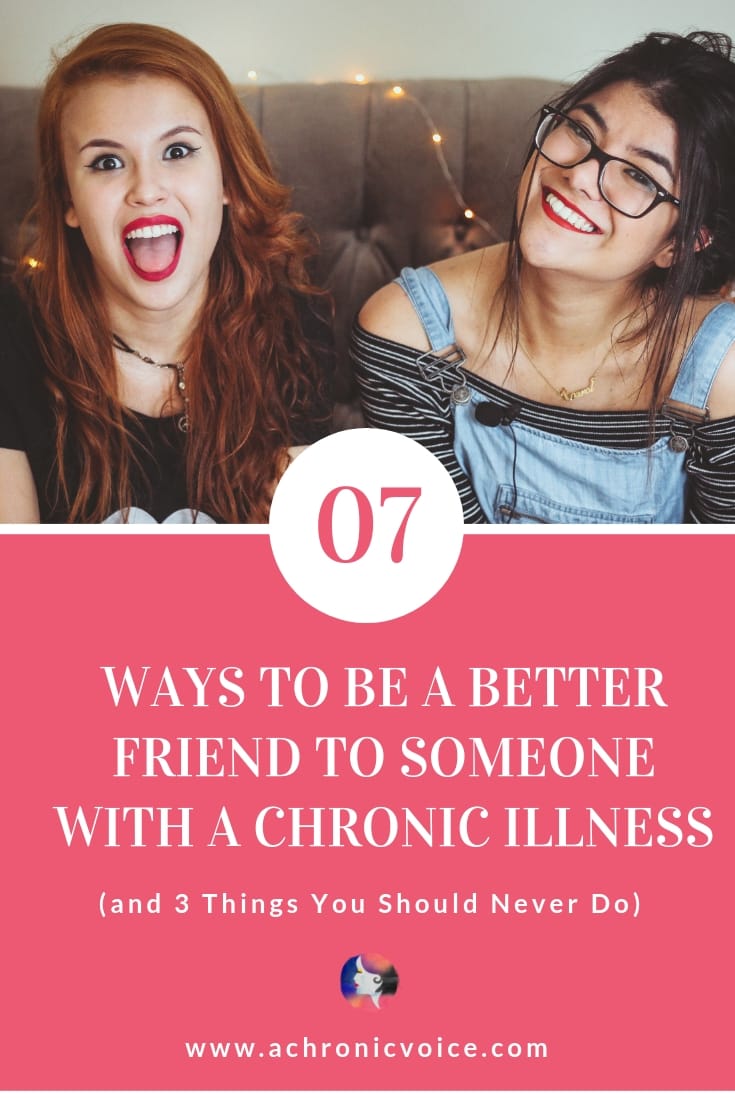
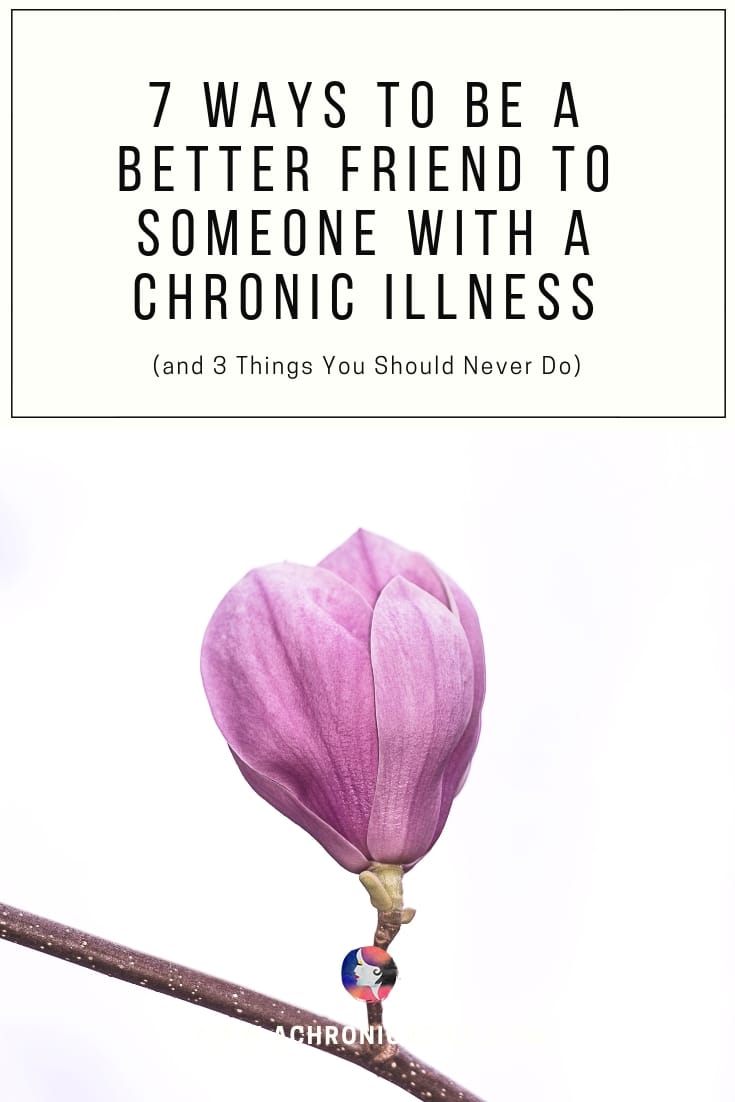
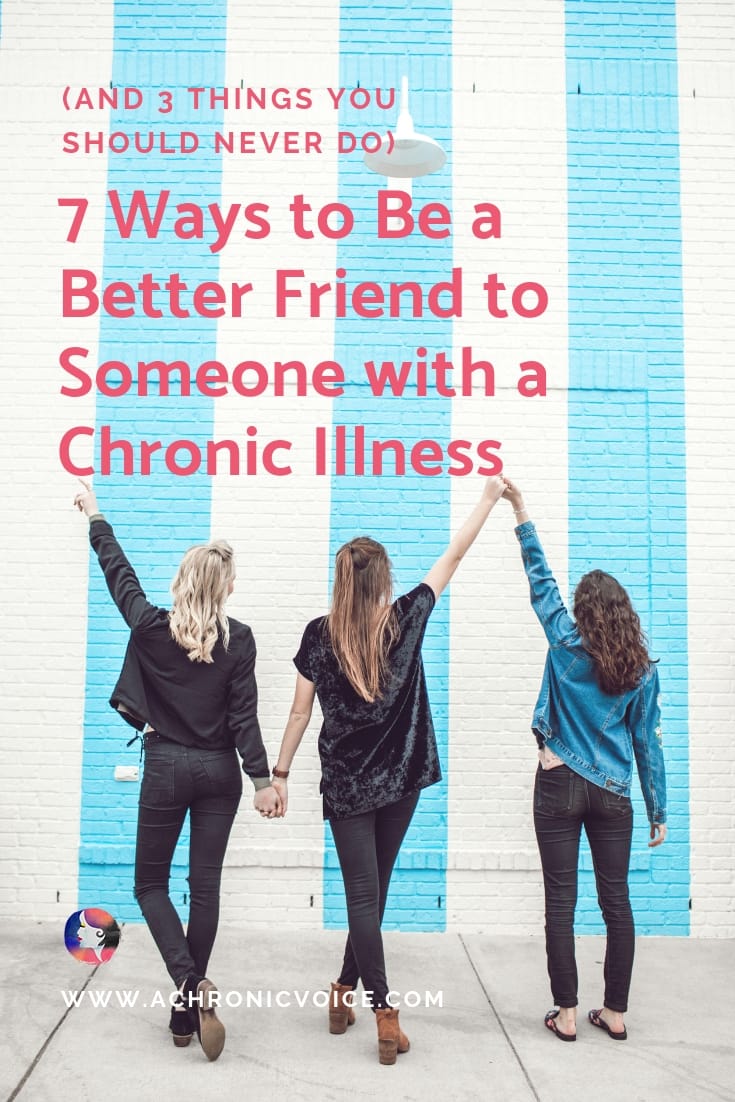
Contributor Bio
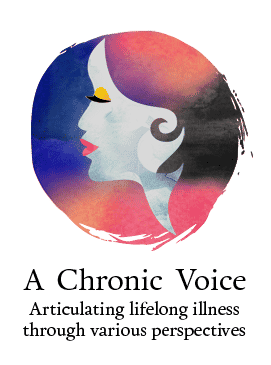
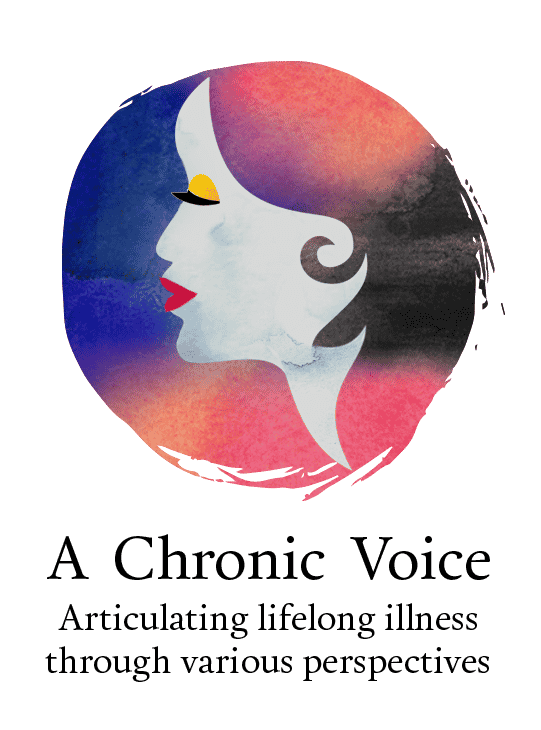
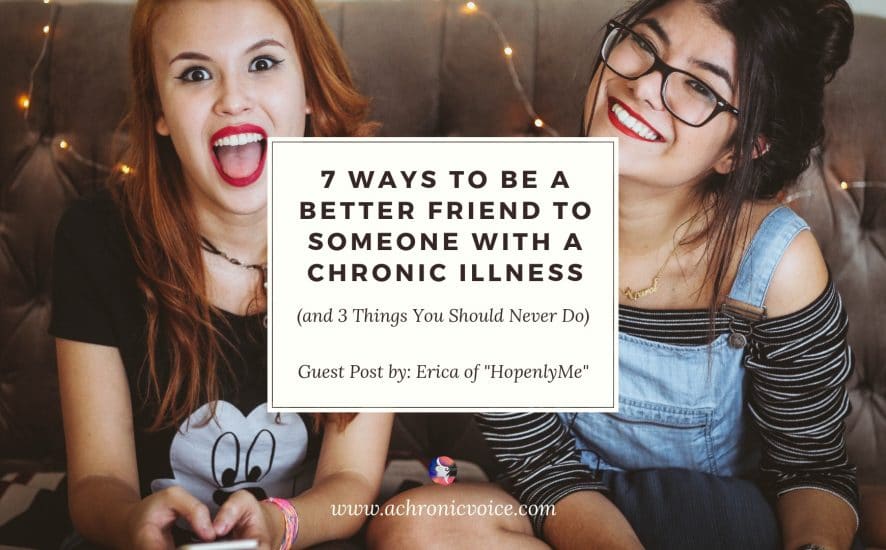

I resonate with so many of these. Thank you for sharing these tips! I especially loved your comment about feeling anxious out in public. It took me a long time to recognize that that was what I was feeling. Great suggestions, thank you!
I love this list, I wish I could hand it to everyone I know. Loneliness and loss of friendships has been one of the hardest things about chronic illness for me. No matter how much I explain things people just don’t understand what it’s like and I’m often judged by others and made to feel guilty for being restricted in what I can do. Hopefully as more awareness is raised we’ll receive more empathy, kindness and support.
Thanks Lucy. I know the feeling… I don’t think I have anymore close friends for a variety of reasons. The pandemic, friends going on to make babies and form family clusters, isolation from chronic illness, yada yada. So it can become even more isolating in the end, save for internet spoonie friends 🙂
I agree that more empathy, kindness and support are needed. Not just for us, but for all humanity 🙂
“Listen Without Trying to Provide a Solution” – this has to be my most desired one from the list. I don’t think spoonies share because they’re looking for solutions – we just share!
My good friend recently told me I talk too much about my chronic illness… so I must be focusing on it too much and maybe that is a problem. And then when on to say a whole lot of other typical stigma things like maybe I shouldn’t be on all my meds… It shocked me but I know she just doesn’t quite understand how serious my health issues are because she doesn’t see me at my worst. I was deeply hurt by it because I spend a great deal of time distracting myself from the pain and Not focusing on it … I just thought she was the sort of person I could be honest with about how I feel when she asks me. But Now I am going to constantly feel like I am talking about it too much or complaining… and won’t be mentioning anything anymore. Such is life.
I’m sorry Nikki, but that’s a horrible thing for a good friend to say. An acquaintance, maybe, but a good friend?! 🙁 Sending hugs. I definitely think it’s okay to talk about your pain anytime as it’s part of our normal lives. And especially to loved ones it should be much easier to talk to them about.
I so agree with ‘listen without trying to provide a solution’ – how many of us have been talking and then got the ‘cure’ that a person’s aunt’s dog’s sister had . . . listening alone is so important and helpful. I’m sure we have thought through most treatment options.
Hi Claire, yes it can be so invalidating especially when it comes from a loved one. Listening is such an underrated skill of the 21st century.
Thank you so much for this article! It was SO perfectly laid out. The part that meant the most to me was not assuming. Honestly, if someone asked me about my chronic illness I’d be completely willing to share. But, unfortunately, stigma and assumptions make it so most people have no idea what to say and think they shouldn’t ask. Just ask me, I’d love to share!
Hello, thank you for reading this guest post 🙂 Yes I think these are such fantastic nuggets of advice and wisdom for communication and how to be a better friend (to anyone, really!). Assumption is just plain annoying and ignorant, agreed.
Great article. As a chronic acute migraine sufferer I really relate to the loss of relationships. Like you, I never know when it’s going to happen. I hate cancelling but unfortunately cancelling is usually all I can manage before blocking all light and sound, and going to bed. However, I am fortunate enough to have one friend who has been through this with me for fifty years. Unfortunately, she was recently diagnosed with stage 4 pancreatic cancer. The thought of losing her is devastating. But I’m going to put your list to use with her. She is the one who needs support now.
Hi Patricia, thanks for reading and sharing your own experiences. The isolation is definitely a painful and huge factor when it comes to dealing with chronic pain. I am so sorry to hear about your friend 🙁 I hope you and her hang in there and see it through as the most wonderful of friends. Please send her my love and gentle hugs x
Hey! I just wanted to stop by and let you know I absoloutly LOVE your blog I also wanted to drop a little message to let you know that I have nominated you for a Sunshine Blogger Award! You can find your nomination here – https://spooniesanctuaryblog.wordpress.com/2018/12/13/ive-been-nominated/ with what to do next.
With Love,
Spoonie Sanctuary
Hi Karley, thank you so much for your kind support, it’s much appreciated 🙂 And thank you for the nomination, will share it on my social! Here’s an old one I did btw, if you were interested 🙂 https://www.achronicvoice.com/2017/07/06/sunshine-blogger-award/
This is a fab and useful post. I’m guilty of hiding how bad my illness can be & have had some relationships end because of my illness.
Hi Nicola, I think it’s a really detailed and useful post by Erica, too! I wrote something about this as well, regarding being sick and ‘filtering’ out the people in my life, if you are interested! 🙂 https://www.sicklessons.com/attract-best-people/